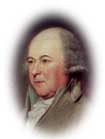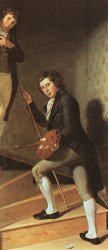1800-1809 |
Political
and Social History |
Literature |
1800 |
1800 Census: Population about 5.3 million people.
30 August. Gabriel Prosser's plan to lead Virginia
slaves in rebellion is revealed.
The Library of Congress is established. In 1815,
Thomas Jefferson's library of 7,000 volumes will be purchased.
In Philadelphia, free African Americans
petition Congress to end the Fugitive Slave Act of 1793.
Congress convenes in Washington, D. C. for the
first time.
John
Chapman, a.k.a. "Johnny Appleseed," begins dispensing apple seeds
and seedlings to settlers in Ohio.
 Thomas
Jefferson is chosen as president over incumbent John Adams in a contested
election that is decided in the House of Representatives; Aaron Burr becomes
vice-president. With this election, the Federalist party loses control
of the presidency and of Congress. (Image of John Adams
courtesy of the
Images of American Political History site.) Thomas
Jefferson is chosen as president over incumbent John Adams in a contested
election that is decided in the House of Representatives; Aaron Burr becomes
vice-president. With this election, the Federalist party loses control
of the presidency and of Congress. (Image of John Adams
courtesy of the
Images of American Political History site.)
|
Charles Brockden Brown, Clara
Howard and Jane Talbot (epistolary novels); second part of Arthur
Mervyn |
1801 |
War with Tripoli begins and will last until 1805.
In the last weeks of his presidency, John Adams
creates new judgeships and "packs the courts" with Federalist appointees
to mitigate the effects of the election. Among his appointments is
John Marshall as Chief Justice of the Supreme Court.
|
|
1802 |
4 July. United States Military Academy opens
at West Point, N. Y. Among its cadets will be Ulysses Grant, Robert
E. Lee, and Edgar
Allan Poe.
|
|
1803 |
In the case of Marbury
v. Madison, the Supreme Court under Chief Justice John Marshall
rules that an act of Congress is null and void when it conflicts with provisions
of the U. S. Constitution. This is the first important test of the system
of checks and balances between the executive, legislative, and judicial
branches of government.
May. Louisiana purchase ($15 million) doubles
the land area of the United States.
31 August. Lewis
and Clark expedition sets out down the Ohio River; they will complete
a 3-year journey to the West Coast.
Passage of the 12th Amendment: election
of president and vice president on separate ballots.
|
Charles Brockden Brown, Memoirs
of Carwin the Biloquist (November 1803-March 1805) |
1804 |
April. Aaron
Burr is defeated in his campaign for governor of New York.
May. Lewis and Clark expedition leaves St. Louis.
By October, the expedition is encamped for the winter at a Mandan Indian
village near what is now Bismarck, N.D.
July. Aaron Burr challenges Federalist Alexander
Hamilton, his longtime rival, to a duel after Hamilton had successfully
foiled Burr's bid to become governor of New York. Burr shoots
Hamilton, who dies 10 hours later.
Jefferson wins a second term as president, with
George Clinton as vice president.
|
|
1805 |
May. Members of the Lewis and Clark expedition
see the Rocky Mountains; in November, they see the Pacific Ocean.
Lt. Zebulon Pike explores the Louisiana Territory.
 Painter
Charles Willson Peale establishes the Pennsylvania
Academy of the Fine Arts, where this trompe l'oeil picture
by Peale, The
Staircase Group (1795), is still exhibited.(Picture
courtesy of Carol
Gerten's Fine Art site.) Painter
Charles Willson Peale establishes the Pennsylvania
Academy of the Fine Arts, where this trompe l'oeil picture
by Peale, The
Staircase Group (1795), is still exhibited.(Picture
courtesy of Carol
Gerten's Fine Art site.)
|
Mercy Otis Warren, Rise, Progress and
Termination of the American Revolution, a three-volume history that
is the earliest such account by an American. |
1806 |
Noah Webster issues his Compendious Dictionary
of the English Language
Lewis and Clark expedition winters at Fort Clatsop
in Oregon and ends its journey by returning to St. Louis in September.
The Cumberland Road is built to facilitate western
settlement.
|
|
1807 |
Embargo Act bans all trade with foreign countries
and forbids American ships to set sail for foreign ports. This act
has a lasting negative effect on New England seaports.
The Clermont,
first reliable steamboat, travels from New York City to Albany, N.Y.
The Chesapeake-Leopard
incident in which three Americans are seized or "impressed" as seamen
from the American ship Chesapeake stirs anti-British feeling.
|
Washington
Irving, his brother William, and James Kirke Paulding start an anonymous
satirical magazine, Salmagundi.
Joel Barlow, The
Columbiad |
1808 |
The Osage, a Sioux tribe, sign the Osage Treaty
ceding their lands in what is now Missouri and Arkansas to the U. S.
Thomas Jefferson refuses to run for a third term
as president, naming James Madison as his successor.
|
James N. Barker, The Indian Princess,
or La Belle Sauvage; first play having Native American life (that of
Pocahontas) as its subject. |
1809 |
Shawnee leader Tecumseh
begins to establish a defensive confederacy to resist the westward movement
of white settlers.
New England governors refuse to supply militia
to enforce the Embargo
Acts (of 1807 and 1808)
Phoenix completes the first sea voyage
by a steamboat by traveling around the shores of New Jersey.
|
Washington
Irving, History of New York
|
 Thomas
Jefferson is chosen as president over incumbent John Adams in a contested
election that is decided in the House of Representatives; Aaron Burr becomes
vice-president. With this election, the Federalist party loses control
of the presidency and of Congress. (Image of John Adams
courtesy of the
Images of American Political History site.)
Thomas
Jefferson is chosen as president over incumbent John Adams in a contested
election that is decided in the House of Representatives; Aaron Burr becomes
vice-president. With this election, the Federalist party loses control
of the presidency and of Congress. (Image of John Adams
courtesy of the
Images of American Political History site.) Painter
Charles Willson Peale establishes the Pennsylvania
Academy of the Fine Arts, where this trompe l'oeil picture
by Peale, The
Staircase Group (1795), is still exhibited.(Picture
courtesy of Carol
Gerten's Fine Art site.)
Painter
Charles Willson Peale establishes the Pennsylvania
Academy of the Fine Arts, where this trompe l'oeil picture
by Peale, The
Staircase Group (1795), is still exhibited.(Picture
courtesy of Carol
Gerten's Fine Art site.)